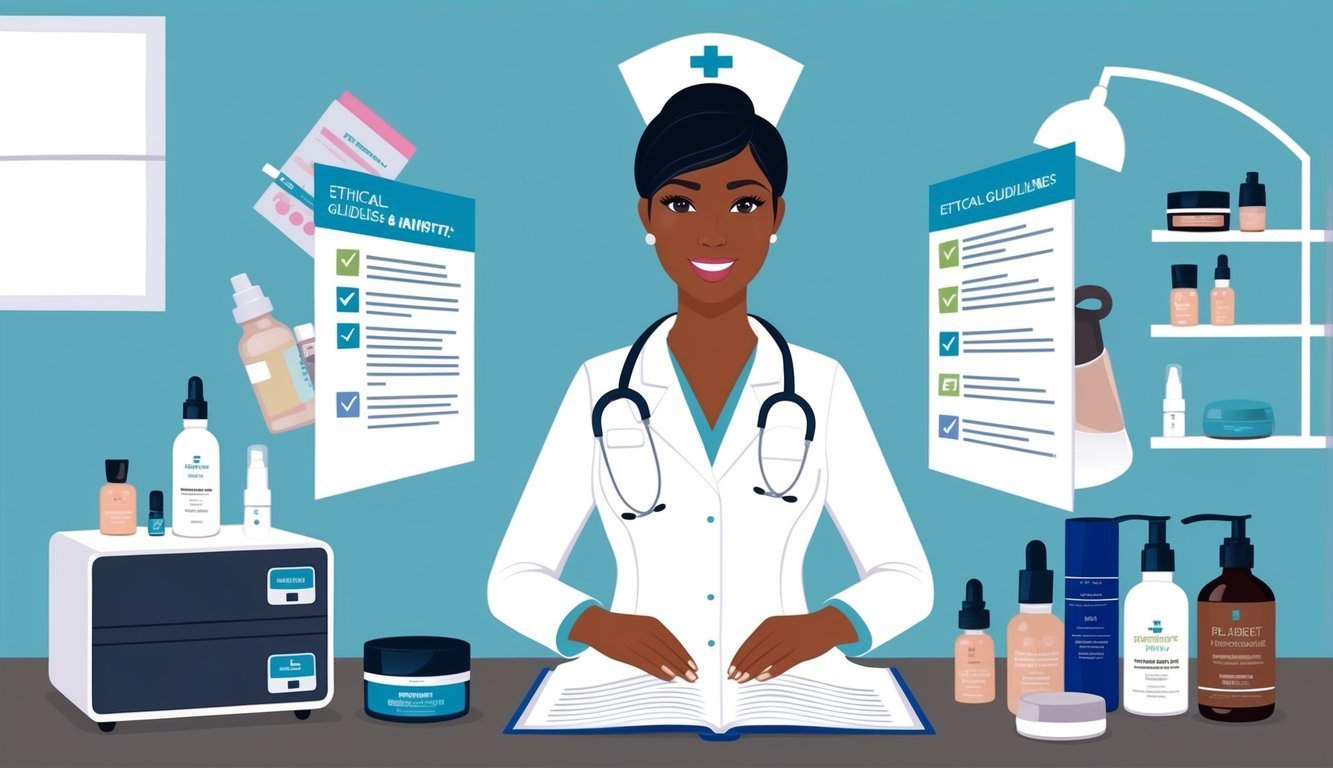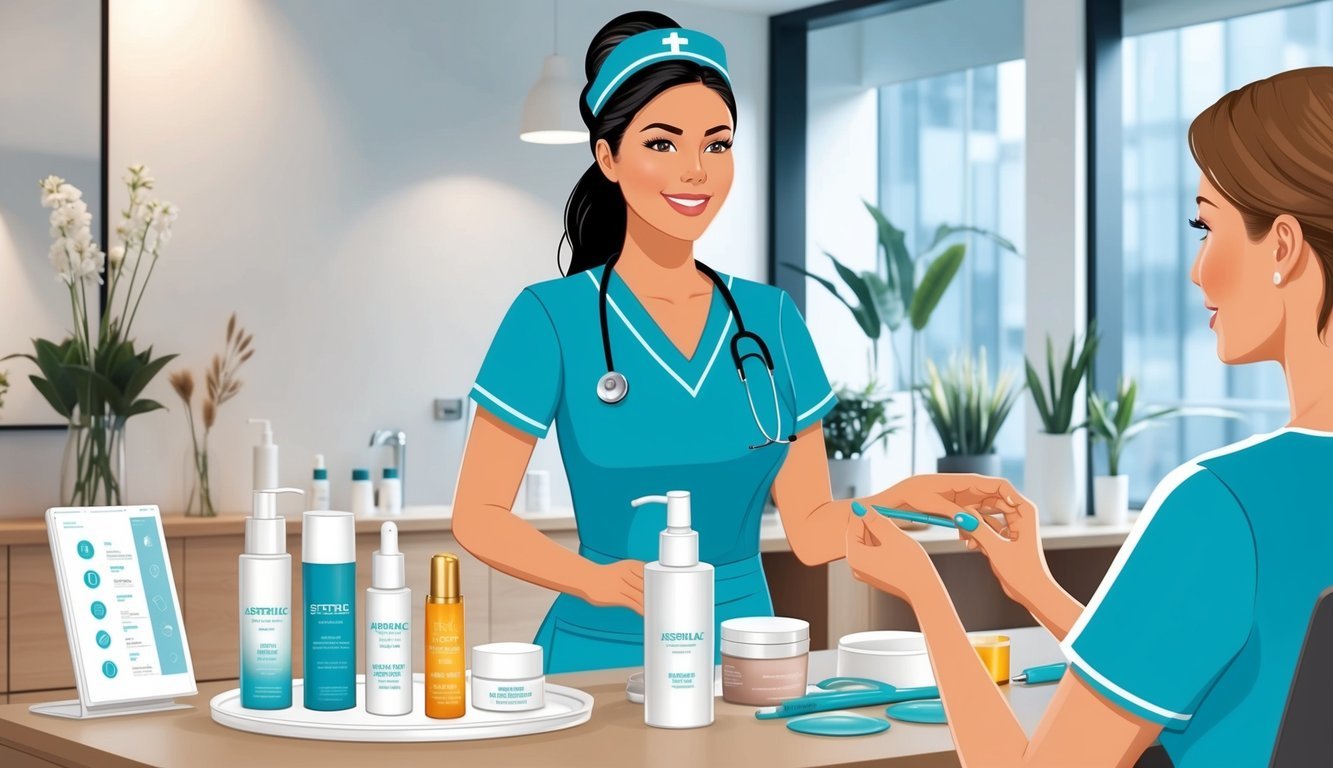Becoming an aesthetic nurse offers a rewarding career path in a growing field that focuses on enhancing patient appearance while ensuring their safety.
To start this journey, you need to obtain your nursing degree.
Typically, you can do this through an Associate Degree in Nursing (ADN) or a Bachelor of Science in Nursing (BSN).
After that, you need to pass the NCLEX-RN exam to become a licensed registered nurse.
With a strong foundation in nursing, you can pursue specialized training in aesthetic procedures, which may include botox, fillers, and laser treatments.
As you advance, you might consider becoming an aesthetic nurse practitioner, which typically requires earning a Master’s degree in nursing (MSN).
This role expands your responsibilities, allowing for greater autonomy in client care and treatment decisions.
Patient safety remains a top priority throughout your training and practice, ensuring that you provide the highest standard of care in aesthetic nursing.
To gain the necessary experience, you can seek internships or work in environments that focus on cosmetic procedures.
Engaging with health professionals and enrolling in relevant courses can enhance your skills and marketability in this competitive field.
Understanding the Role of an Aesthetic Nurse
As an aesthetic nurse, you play a crucial role in enhancing patients’ appearance and boosting their confidence through various cosmetic procedures.
Your responsibilities require a blend of medical knowledge and interpersonal skills to deliver quality patient care in a dynamic environment.
Core Responsibilities and Work Environment
In your position, you will manage a variety of tasks that include assessing patients, developing treatment plans, and performing procedures.
Core responsibilities encompass:
- Conducting Consultations: You will evaluate each patient’s needs and goals, advising them on appropriate treatments.
- Administering Treatments: You’ll perform injectables such as Botox and dermal fillers, as well as other procedures like chemical peels and laser treatments.
- Post-Procedure Care: Monitoring patients post-treatment is essential to ensure their well-being and satisfaction.
Most aesthetic nurses work in medical spas, clinics, and dermatology or plastic surgery offices.
Your work environment emphasizes patient safety and comfort, necessitating a strong understanding of aesthetic surgery and various cosmetic techniques.
Collaboration with dermatologists and plastic surgeons enhances the level of care provided.
Specialized Aesthetic Procedures
Your expertise extends to a range of specialized aesthetic procedures tailored to meet patient demands.
Key procedures include:
- Injectables: Administering Botox for wrinkle reduction and dermal fillers for volume enhancement.
- Laser Treatments: Utilizing lasers for skin resurfacing, hair removal, and pigmentation correction.
- Chemical Peels: Applying chemical solutions to improve skin texture and reduce signs of aging.
By mastering these techniques, you help patients achieve their aesthetic goals.
Continuous education on industry advancements is vital in maintaining your skills and ensuring effective patient outcomes.
Educational Pathways
Becoming an aesthetic nurse requires specific educational qualifications and training.
Understanding the necessary degrees and licensure is key to entering this specialized field.
Nursing Degrees and Licenses
To start your journey, you must obtain a nursing degree.
The primary pathways include:
| Degree Type | Duration | Description |
|---|---|---|
| Associate Degree in Nursing (ADN) | 2-3 years | Often offered at community colleges, this degree prepares you for entry-level nursing roles. |
| Bachelor of Science in Nursing (BSN) | 4 years | This degree provides a comprehensive education in nursing and is preferred by many employers. |
Upon earning your degree, you need to pass the NCLEX-RN exam to obtain your nursing license.
This licensure allows you to practice as a registered nurse (RN).
With an RN license, you can then gain experience in various nursing settings, which is essential for transitioning into aesthetic nursing.
Graduate Education and Specialized Training
For those aiming to become aesthetic nurse practitioners, advanced education is often necessary.
Options include:
| Program Type | Degree | Focus Areas |
|---|---|---|
| Master of Science in Nursing (MSN) | 1-2 years | Prepares you for advanced practice, often including coursework in aesthetics and dermatology. |
| Workshops and Certifications | Varies | Short courses focusing on specific aesthetic procedures such as Botox and fillers can enhance your skill set. |
After completing graduate education, additional specialized training in aesthetic procedures is recommended.
Attending workshops can provide hands-on experience in aesthetic medicine.
Certifications and Continuing Education
To excel as an aesthetic nurse, obtaining the right certifications and engaging in ongoing education is essential.
These elements not only enhance your skill set but also bolster your professional credibility in a competitive field.
Aesthetic Nurse and Cosmetic Nurse Certifications
To become a certified aesthetic nurse, you typically start with an RN license and pursue additional certifications.
Key certifications include:
- Certified Aesthetic Nurse Specialist (CANS): This credential showcases expertise in aesthetic practices and requires a minimum of 1,000 hours in aesthetic nursing over the past three years.
- Certified Plastic Surgery Nurse (CPSN): Offered by the Plastic Surgical Nursing Certification Board, this certification is tailored for those involved in plastic surgical settings.
- Dermatology Certified Nurse Practitioner (DCNP): While primarily for nurse practitioners, it emphasizes specialized knowledge in dermatological care, beneficial for aesthetic practices.
Each certification has its prerequisites and provides a framework for your professional development.
Maintaining these certifications often involves periodic renewal, which may require continuing education credits.
Continuing Education for Professional Development
Continuing education is critical in the aesthetic nursing field due to rapidly evolving technologies and techniques.
Engaging in ongoing learning can include:
- Attending workshops, conferences, or webinars specific to aesthetic practices.
- Enrolling in courses focusing on injectables, laser treatments, and skin care management to enhance your clinical skills.
Many professional organizations offer CE opportunities tailored to aesthetic nursing.
Online platforms like Nurse.org provide resources for finding relevant courses.
Regularly participating in continuing education not only meets certification requirements but also keeps you informed of the latest developments in the field, ensuring that you deliver the best care to your patients.
Navigating the Job Market

Finding a position as an aesthetic nurse requires understanding the various career opportunities available and the importance of networking.
Building a professional reputation in this specialized field will significantly enhance your job prospects.
Career Opportunities and Settings
As an aesthetic nurse, you have multiple settings to consider for employment.
Common workplaces include:
| Setting | Description |
|---|---|
| Med Spas | Offer a variety of cosmetic services ranging from laser treatments to injectables. |
| Dermatology Clinics | Focus on skin health and aesthetic procedures, often requiring specialized knowledge. |
| Plastic Surgery Offices | Involve assisting with pre-operative and post-operative care of aesthetic procedures. |
| Outpatient Surgery Centers | Focus primarily on minor cosmetic surgeries that require professional nursing support. |
| Private Practices | Smaller settings where you may perform individualized care and establish personal relationships with patients. |
Each of these environments demands a different set of skills and experiences, providing you with diverse career pathways within aesthetic nursing.
Salary potential varies, with aesthetic nurse salaries ranging widely depending on the setting.
Networking and Building a Professional Reputation
Networking is crucial in the aesthetic nursing job market.
Engaging with industry professionals can lead to job opportunities and mentorship.
Attend industry conferences, workshops, and local nursing association meetings.
You should also consider joining online forums and social media groups focused on aesthetic nursing.
These platforms can help you build connections and share insights.
Building a strong professional reputation involves showcasing your skills and expertise.
Obtain certifications in aesthetic procedures, such as injectables or laser treatments.
This not only enhances your qualifications but also boosts your credibility among peers and potential employers.
Demonstrating proficiency and staying updated on industry trends is key to standing out in a competitive field.
Maintaining Professional Standards and Ethics

In aesthetic nursing, adherence to professional standards and ethical practices is crucial.
Ensuring patient safety and delivering quality care must be at the forefront of your practice.
This encompasses continuous education, effective communication, and ethical decision-making throughout various stages of patient interactions.
Patient Safety and Quality of Care
As an aesthetic nurse, your primary responsibility is to ensure the safety of your patients.
This begins with comprehensive patient consultations, where you assess their medical history and set realistic expectations for procedures.
Key points include:
- Conducting thorough assessments before any aesthetic intervention.
- Implementing pre- and post-procedure care instructions to mitigate risks.
- Staying updated on the latest techniques and technologies in the field to enhance the quality of care you provide.
It’s essential to follow evidence-based practices and maintain open lines of communication with patients.
Regularly reviewing patient outcomes and striving for continuous improvement can significantly enhance the level of care you offer.
Ethics in Aesthetic Nursing
Your role as an aesthetic nurse requires you to respect patients’ rights and obtain informed consent for all procedures.
Important ethical aspects to consider:
- Honesty and Transparency: You must clearly communicate potential risks and benefits of procedures. This ensures that patients make informed decisions.
- Confidentiality: Protect patients’ private health information. Make sure to adhere to legal and professional guidelines.
- Professional Boundaries: Maintain a professional rapport with patients. Avoid conflicts of interest and personal relationships that may compromise care quality.
By prioritizing ethical practices, you build trust with your patients, enhancing their overall experience in your care.
The commitment to ethics and safety can ultimately define your success as a dedicated aesthetic nursing professional.

